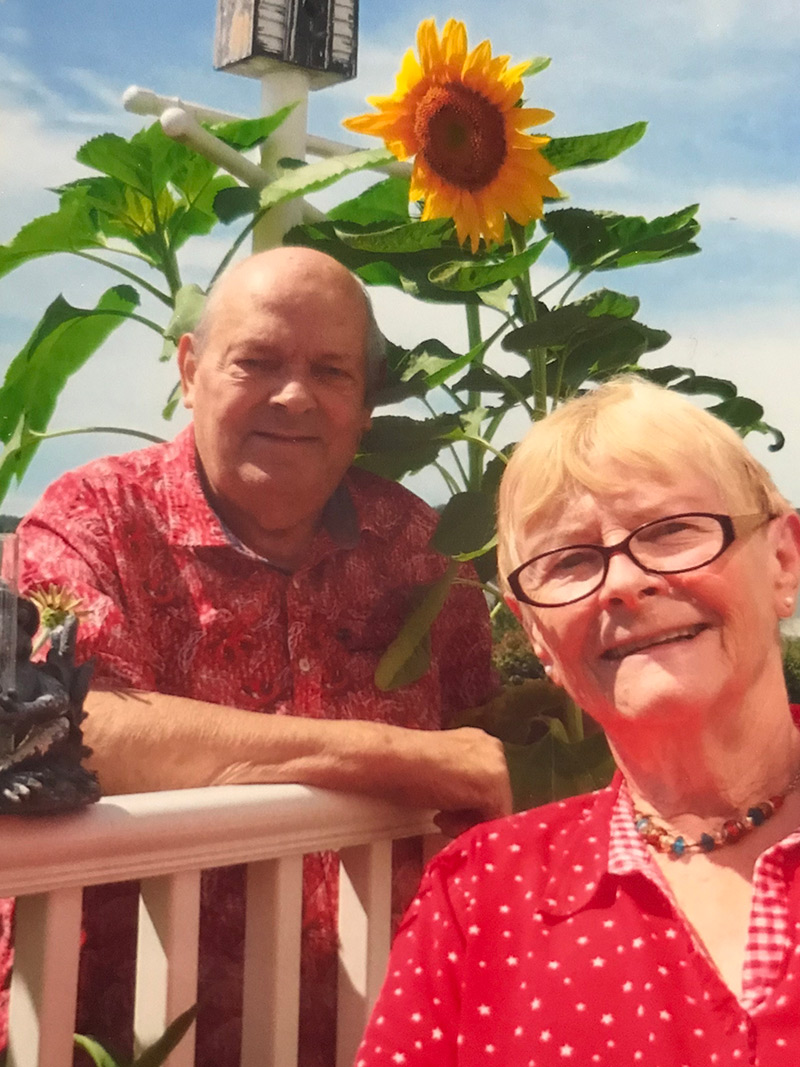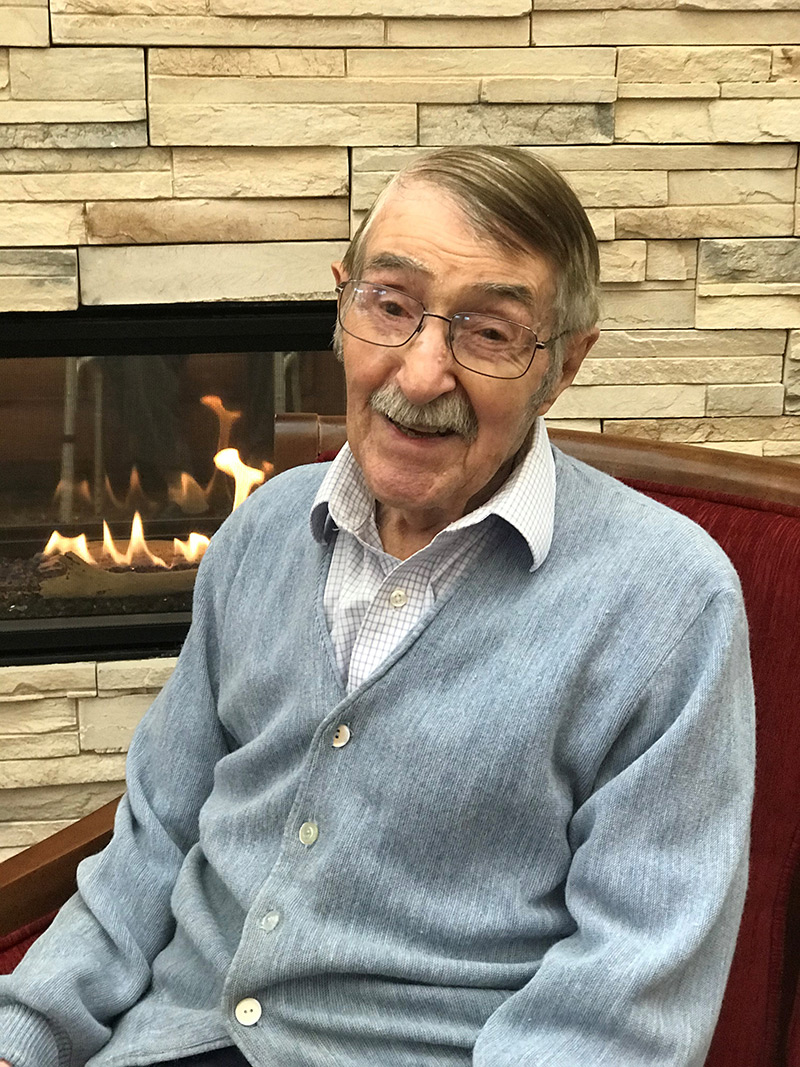Years from now we’ll look back and remember 2020 as a major milestone in history. The COVID-19 global pandemic has affected our lives in many ways that we are not likely to forget. But for many in Berks, this is not the first historic moment in their lives, and it won’t be the last. These three local seniors have survived – and thrived – through some of history’s most momentous occasions and serve as a reminder that obstacles are meant to be overcome.

Sigi & Wolf Schmidt, Green Hills
Born in the East German state of Mecklenberg in the 1930s, both Wolfgang and Sigi Schmidt were raised among the battlefields of WWII before escaping west with their families and eventually emigrating to the United States to start their lives together.
Adventures West
Wolf, one of eight children, was born in Mirow in 1936. “My mother actually got an award from Hitler for having so many children,” he remembers. “He said that a mother with so many children is as respected as a general in his eyes.” The family’s reward was to have Wolf’s father, a solider in the German army, stationed closer to home. Willi Schmidt was working in his new post at a nearby military airport when he was arrested for speaking out against the regime.
As a young boy living with his mother, Hertha, Wolf recalled that “at night Allied bombers soared overhead to their targets in Berlin and west,” their windows rattling from explosions miles away. After the war was lost, Russian troops advanced through their small farm town. “When the Russians swept through the towns and cities, they plundered and raped and confiscated everything of value. They entered homes and made people move elsewhere,” says Wolf. His family was displaced, forced to live in the woods for several months. “I was only eight years old at the time, and we had a lot of fun hiding from the Russians,” says Wolf. “Of course, for our parents it was terrible.”
The last time Wolf saw his father was when Willi was arrested for the second time. Soon after, Hertha smuggled her children into West Germany under the guise of attending a wedding. They were assigned to the Wipperfuerth refugee camp before establishing a home in the same town of Solingen.
Twin Tales of Escape
Sigi was only five years old when the bombs fell on her hometown of Gustrow. Her father was fighting in the war, leaving her mother alone with Sigi and her two sisters. “When the sirens went off, we had a little suitcase ready with our gas masks,” she says. “Mom herded us into the basement in the pitch dark, and we escaped through a secret wall into the neighbor’s row home.” They ran to her Oma and Opa’s farm in the countryside, but even there they weren’t spared from Russian violence and looting.
Shortly after the family returned home, they learned that Sigi’s father had been killed in action, and that there was a mysterious warrant for her mother’s arrest. To escape persecution, they snuck across the border, hidden in the back of a furniture truck. They too were assigned to refugee camps in Solingen.
They spent nearly a year between two camps – first in Wipperfuerth and then in Borg Hohenscheid – before her mother was able to secure an apartment, only to be arrested and her children sent to an orphanage. After her mother was finally released, the small family could finally begin to rebuild.
Then Sigi met Wolfgang. They were married in 1958 and applied for their visa to emigrate to the United States the same year, where they were sponsored by Wolf’s brother. The Schmidts built a wonderful life for themselves and their four children here, and they still return to Germany every few years to visit family and friends.
When they aren’t traveling, the couple stays very active in their retirement at The Heritage of Green Hills; Sigi gardens, paints, sews and rides her motorcycle whenever she can. She jokes, “I have so many hobbies, and Wolfgang is busy watching me doing all of these things.”
And although they’re still writing their own story, Wolf’s family history has already been recorded. Laurence W. Mazzeno published Omi: Mother Courage in 2008 to memorialize Hertha Schmidt’s bravery and her family’s sacrifices in WWII. The book is available for purchase on Amazon.

Clarence “Dutch” Glauner, Wyomissing
On March 22, longtime local Dutch Glauner celebrated his 110th birthday. He passed away on Aug. 17, 2020, just after the interview for this article. Mr. Glauner lived through more major milestones than most. This wasn’t even the first pandemic he experienced. Dutch was eight years old when the Spanish Flu rocked the country, but that didn’t slow him down.
More than a Century of Milestones
Dutch was born in 1910 and was thought to be the third-oldest person in the United States. The staff at The Highlands at Wyomissing, where he lived since 1990, marked his birthday with a simple celebration. They had a much larger event planned for post-COVID. Glauner's passing hit them quite hard, and it's been difficult for many mourning his loss. When asked about his age, Dutch told us, “When I was 102, I said I'd live to be 110. I don't feel that old. I feel more like 80, maybe less. I guess I was too busy dating girls, I forgot how old I got.”
Of course, that was until he met his wife, Margaret (Peggy to him), and they married in 1930. “I married a very lovely girl,” Dutch reminisced. “She was a lovely person to know. We built a house and a family, and really had an enjoyable life.” The couple had two children, Leroy (“Buddy”) and Betty. Peggy passed 10 years ago at the age of 100 and after more than 70 years of marriage. Betty recently passed at 88.
In addition to staying young at heart, Dutch attributed his long life to a combination of good genes and a lifetime of hard work. He grew up on a dairy farm in Elverson with his seven siblings, where he was already lending a hand at the young age of six. “It was lovely living on a big farm. I can remember my brother Emerson and I used to spread hay and bed the stables for the cows, he said.”
Surviving the Spanish Flu
Then, in 1918, the Spanish Flu pandemic broke out. Both his father and his brother came down with the disease. “I remember my dad having the flu awful bad. Before him, my oldest brother Frank had it. For a couple of days, the doctors didn’t expect Frank to live,” he recalled. They had all but given up on Frank when Dutch’s uncle John came to town to help the men recover and to lend a hand around the farm. “He tended to two or three very sick people, but he never got the flu.” Dutch also remembered getting help from many of their neighbors. “Everyone was sick, so everybody helped each other.” Then almost as fast as it came, the pandemic subsided, and life returned to normal.
When his father passed two years later, Dutch’s mother was forced to sell the farm. He spent his teenage years working on some of the first Ford cars and learning various trades, specifically working with metal roofing. “I could craft anything you wanted out of metal.” In 1940, at 30 years old, he registered for the draft, but as a sheet metal worker – a reserved occupation – he was exempted from service.
During the war he turned his attention to a new trade and became a plumber’s apprentice. “They depended on me for everything in the business, and it seemed like they used me for too much, so I decided to go out on my own,” Dutch said. In 1945 he opened C.C. Glauner & Son along with his son, Buddy. The business closed when he retired in 1980, and from then on, Dutch made it a point to just enjoy life. But farming was where his heart remained. When he could, he would still help with gardening at the Sullivan County farm he and Peggy purchased together, and where Buddy lives today.
















